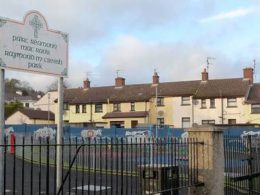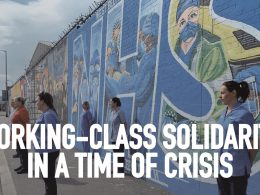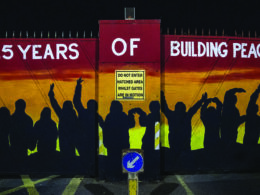One year on from the killing of two British soldiers at Massereene barracks in Antrim and the shooting of a PSNI officer in Craigavon, attacks carried out by dissident republican groups have become more frequent, sophisticated and deadly.
The car bombing of Newry Courthouse came after several failed attempts to detonate large bombs such as the 300lb bomb intended to target Ballykinler army base in Co. Down. It was the first activated car-bomb of it’s kind since the Real IRA (RIRA) Omagh bomb in 1999 which killed 29 people – the single worst atrocity of the Troubles. Given that there was reportedly only 17 minutes warning given to the police, it was extremely fortunate nobody was killed. Customers at a nearby pub were given no warning by the police.
It is evident the dissidents have adapted their methods of organisation as a result of high levels of infiltration by the state. The recruitment of former IRA volunteers, some with advanced bomb-making expertise, into the dissident groups has strengthened their capability to carry out attacks. There also appears to be a far higher level of co-operation amongst the various dissident organisations, sharing intelligence and assisting in the execution of military operations.
No mass support
While these groups lack any mass support, there has been growth in support, especially amongst young unemployed working class Catholics, who like young Protestants, have seen no benefits from the right-wing policies of the Assembly parties. This was seen last summer when dissidents mobilised youth in clashes with the PSNI, as the Orange Order marched past the Ardoyne shops in North Belfast.
In areas such as Craigavon and more recently in West Belfast along the Springfield Rd and Stewartstown Rd, scores of youth, some as young as 10 years old are involved in nightly sectarian clashes. The tactic of luring police into residential areas, by planting hoax devices, in order to carry out petrol bomb attacks on police is a tactic which dissidents could now replicate across the North.
The use of these tactics give no thought whatsoever to working class communities caught in the crossfire between dissidents and the police. Members of the local community in the Catholic estates of Drumbeg and Meadowbrook in Craigavon have correctly spoken out against the response of the PSNI in firing plastic bullets in residential areas, which have killed innocent people in the past.
There is also anger in working class Catholic areas against the actions of republican dissidents who are responsible for whipping up sectarian riots and clashes with police. Indeed, it is a strategy of the dissident paramilitary groups to provoke the state into introducing more repressive measures in Catholic areas, which they believe can create the conditions for recruitment and escalating a campaign of individual terrorism akin to the IRA campaign in the past.
There are growing demands from sections of unionism, especially from the more hardline wing of the DUP and the TUV for robust action against the dissidents, including calls for the return of troops and a shoot-to-kill policy. It is possible that as a result of a state clampdown , dissident republicans or youth involved in these riots could be killed. In such a situation, massive pressure would mount on Sinn Fein which would threaten the future of the political institutions.
No return to sectarian conflict
Republican dissidents falsely believe that the “armed struggle” can be simply recreated today, but conditions in 2010 are completely different to the beginning of the Troubles. The overwhelming majority of working class people, Protestant and Catholic are vehemently opposed to a return to conflict. A crucial difference today is that if developments were to lead to an escalation of paramilitary conflict, it would be an outright sectarian conflict, leading to disastrous consequences for working class people.
At this time, the dominant mood is against a return to conflict. However, unless a mass socialist alternative is built which can provide a way forward for workers and youth, then at some point sectarian reactionary organisations such as dissident republicans and loyalist forces will fill the vacuum.
No more killings
The rise in punishment shootings by dissident paramilitaries is also an attempt to “replace” the role of the IRA in “policing” Catholic areas. The recent murder of Kieran Doherty by the RIRA in Derry for allegedly being involved in drug dealing has disgusted local people. The idea that sinister organisations, which are involved in criminal activities such as smuggling can act as judge, jury and executioner has enraged most people.
The initiative of Derry Trades Council to call a rally in opposition to the murder in this respect is to be welcomed. Without the trade union movement providing a vehicle through which working class people can unite against sectarianism on both sides, then a dangerous vacuum could be filled by sectarian forces. A working class party is needed to provide a real alternative to the forces of sectarianism.
It is no coincidence that dissident republicans have been able to organise riots in areas hit hard by high unemployment, poor housing and a lack of decent facilities for young people.
The savage cuts which the Executive is implementing will deepen the recession in Northern Ireland, resulting in further unemployment. The only way out of sectarianism and poverty is to build a socialist party which can unite workers and youth in a common struggle against the capitalist system which can only offer poverty and alienation.

The cul-de-sac of dissident republicanism
One year on from the killing of two British soldiers at Massereene barracks in Antrim and the shooting of a PSNI officer in Craigavon, attacks carried out by dissident republican groups have become more frequent, sophisticated and deadly.











